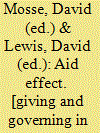| Srl | Item |
| 1 |
ID:
066746


|
|
|
|
|
| Publication |
London, Pluto Press, 2005.
|
| Description |
vi, 223p.
|
| Series |
Anthropology, culture and society
|
| Standard Number |
0745323863
|
|
|
|
|
|
|
|
|
|
|
|
Copies: C:1/I:0,R:0,Q:0
Circulation
| Accession# | Call# | Current Location | Status | Policy | Location |
| 050388 | 306.3/MOS 050388 | Main | On Shelf | General | |
|
|
|
|
| 2 |
ID:
174425


|
|
|
|
|
| Summary/Abstract |
What place does the caste system have in modern India with its globally integrating market economy? The most influential anthropological approaches to caste have tended to emphasize caste as India's traditional religious and ritual order, or (treating such order as a product of the colonial encounter) as shaped politically, especially today by the dynamics of caste-based electoral politics. Less attention has been paid to caste effects in the economy. This article argues that the scholarly framing of caste mirrors a public-policy ‘enclosure’ of caste in the non-modern realm of religion and ‘caste politics’, while aligning modernity to the caste-erasing market economy. Village-level fieldwork in South India finds a parallel public narrative of caste either as ritual rank eroded by market relations or as identity politics deflected from everyday economic life. But, locally and nationally, the effects of caste are found to be pervasive in labour markets and the business economy. In the age of the market, caste is a resource, sometimes in the form of a network, its opportunity-hoarding advantages discriminating against others. Dalits are not discriminated by caste as a set of relations separate from economy, but by the very economic and market processes through which they often seek liberation. The caste processes, enclosures, and evasions in post-liberalization India suggest the need to rethink the modernity of caste beyond orientalist and post-colonial frameworks, and consider the presuppositions that shape understanding of an institution, the nature and experience of which are determined by the inequalities and subject positions it produces.
|
|
|
|
|
|
|
|
|
|
|
|
|
|
|
|